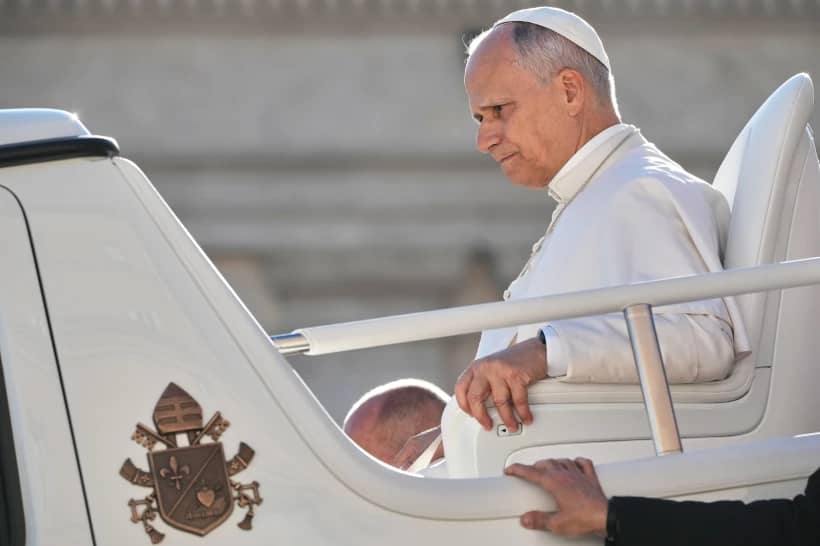ROME— In another case of Pope Francis leading through example, he’s donated $ 110,000 to a Catholic charity to provide medicine for Iraqi refugees in Erbil suffering from chronic illnesses. He did so as part of a campaign aimed at inspiring every diocese, church and movement to make concrete acts of mercy during the Holy Year.
Francis is the first benefactor of a campaign called “Be God’s Mercy,” launched on Friday by the pontifical charity Aid to the Church in Need (ACN).
The four-month fundraising effort will benefit projects such as pastoral ministry in prisons, drug rehabilitation centers, support groups for battered women and aid for refugees.
The pope’s donation will go to St. Joseph’s Clinic in Erbil, part of Iraq’s Kurdistan region, which is currently home to hundreds of thousands of Christian refugees who have had to flee their homes running from the terrorist Islamic group ISIS.
The health center offers medical care to 2,800 patients suffering chronic deceases.
The pontiff expressed his support to the fundraising initiative in a video message, introduced at a press conference in Rome.
“Men and women need the mercy of God, but also our own mercy,” he said. “We need to hold each other’s hands, caress each other, take care of one another, instead of waging so many wars.”
Francis invited “every man and woman of good will” to contribute in creating concrete works of mercy, “something that will remain,” structures that would help meet “the many needs present in the world today.”
“I thank you for everything you do. And don’t be afraid of mercy: mercy is God’s caress!” he said, closing the message.
ACN, also known by its German name “Kirche in not”, which is the one Francis uses throughout the video, is an international Catholic charity under the authority of the Holy See, born in 1947 at the express request of Pope Pius XII to help the refugees after the Second World War.
According to Philipp Ozores, secretary general of ACN, Francis has a long history with this charity.
Ozores said on Friday that 30 years ago, when the future pope was Father Jorge Mario Bergoglio, he visited the main offices of ACN in Germany in an attempt to put a face on the people who had helped him fund projects in his home country of Argentina.
The papal charity has offices in 22 countries, and promotes close to 6,000 humanitarian projects worldwide. It has a special emphasis on assisting suffering and persecuted Christians around the world.
Italian Cardinal Mauro Piacenza, who was present at Friday’s press conference, defined the role of the charity as an attempt to move local churches to help the universal church, aiding those who see their “inalienable right to religious freedom [at risk], either because it’s threatened or because it lacks the minimum resources needed to subsist.”
The prelate defined ACN as a “pastoral initiative” that attempts to provide a response to anything that makes the church suffer, through prayer, study and material aid.
“The Lord makes of Kirche in not an instrument through which he caresses whoever is tired, and pours the balm of mercy on the wounds of those who suffer,” Piacenza said.
Giving further context to the clinic Francis is helping, Father Imad Gargees, a Catholic priest working with Iraqi refugees, said on Friday that the health center makes no distinction between Christians and Muslims and other minorities at risk, but helps as many people as possible.
“Here we understand the meaning of mercy, how much we can do with what little we have by helping our brothers in a difficult situation,” Gargees said. “We hope that one day we too, will be able to help others going through difficulties.”
Archbishop Sebastian Francis Shaw of Lahore, Pakistan, who was present in Friday’s conference to share his experience of living in a country where Christians are at risk, reflected on the importance of material aid being distributed to everyone regardless of their religious background.
Shaw is responsible for a diocese where in March, during Easter Sunday, a suicide bomber killed more than 70 people, most of whom were Christians, as they celebrated the feast of the resurrection. Thirty of those killed by the Islamic fundamentalist were children.
“It was very difficult to console people in those circumstances, to be merciful,” he said.
Shaw told the story of visiting the survivors at a local hospital, where a doctor tending to them, who was Muslim, asked if the bishop had a list of the people who he wanted to see.
“He thought I’d come only for the Christians,” he said.
“I said, I have no list. Victims are victims, whether Christian or Muslim. All are human beings and Christ encourages us to reach out to everyone,” Shaw said.
The fundraising initiative will end on October 4, the feast of St. Francis of Assisi.













